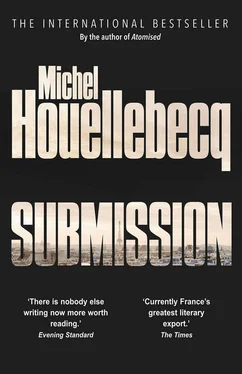It was a mild evening, and the double doors to the back garden had been left open. I helped myself to a glass of champagne, and as I stepped out under the linden trees, I spotted Alice, a lecturer at the University of Lyon III who worked on Nerval. Her delicate dress, printed with bright flowers, must have been what’s called a cocktail dress. The truth is, I’ve never quite grasped the difference between a cocktail dress and an evening dress, but I knew Alice would always wear the appropriate thing and, more generally, act the appropriate way. She was easy company, and I hurried over to say hello even though she was talking to a young man with angular features and very pale skin. He wore jeans, a blue blazer, a PSG T-shirt and bright red trainers. The effect was strangely elegant. He introduced himself as Godefroy Lempereur.
‘I’m one of your new colleagues,’ he said, turning in my direction. I saw he was drinking neat whisky. ‘I was just hired at Paris Trois.’
‘So I’ve heard. You work on Bloy, don’t you?’
‘François has always detested Bloy,’ Alice interrupted brightly. ‘As a Huysmanist, naturally, he’s in the other camp.’
Lempereur gave me a surprisingly warm smile and said quickly, ‘I know who you are, of course. I’m a great admirer of your work on Huysmans.’ Then he paused, as if choosing his words, without once dropping his gaze. His eyes were so intense that I thought he must be wearing make-up — at the very least that had to be mascara on his eyelashes — and I had the feeling that he was about to say something important. Alice watched us with the affectionate, slightly mocking look that women get when they witness a conversation between men — that odd ritual, that is neither buggery nor duel, but something inbetween. Over our heads the linden branches stirred in the breeze. Just then, in the distance, I heard a soft, muffled noise like an explosion.
‘It’s curious,’ Lempereur said finally, ‘that we remain so close to the chosen authors of our youth. One might think, after a century or two, that such passions should have faded, that as academics we might accede to a kind of literary objectivity, et cetera. And yet, not at all. Huysmans, Zola, Barbey, Bloy — they all knew one another, were on good terms or bad, formed allegiances, quarrelled among themselves. Their interpersonal history is the history of French literature, and more than a century later, we keep re-enacting it. We remain loyal to our old heroes. We’ll always be ready to love for their sake, to quarrel, to battle it out in opposing scholarly articles.’
‘Yes, but that’s a good thing. At least, it proves that literature is serious.’
‘Nobody ever quarrelled with poor Nerval,’ Alice interjected, but Lempereur didn’t even seem to hear her. He kept staring into my eyes, as if carried away by his own eloquence.
‘You were never anything but serious,’ he went on. ‘I’ve read all of your articles in the Journal . It wasn’t quite that way with me. I became fascinated with Bloy when I was twenty, fascinated by his intransigence, his violence, his virtuosic gift for scorn and insult — but it was all very much of the moment. Bloy was the ultimate weapon against the twentieth century, its mediocrity, its moronic “engagement”, its cloying humanitarianism; against Sartre, and Camus, and all their political play-acting; and against all those sickening formalists, the nouveau roman, the pointless absurdity of it all. So, now I’m twenty-five. I still don’t like Sartre, or Camus, or anything to do with the nouveau roman, and yet Bloy’s virtuosity seems oppressive to me, and I confess that all his blather about the spiritual and the sacred leaves me cold. Nowadays I would rather reread Maupassant or Flaubert — or even Zola, at least certain pages. And also, of course, the inimitable Huysmans …’
As an intellectual of the right , I was thinking, he was seductive enough. He’d stand out in the department, in a minor way. You can let people talk for a long time, they’re always interested in what they have to say, but every now and then you’re supposed to contribute. I looked over at Alice, but without much hope: as a true Frühromantik, she couldn’t have cared less about the fin de siècle. ‘You’re what,’ I asked, ‘Catholic? Fascist? A little of both?’ It just popped out. I was out of practice with intellectuals of the right — I couldn’t remember how to behave. All at once, in the distance, we heard a kind of sustained crackling. ‘What was that, do you think?’ asked Alice. ‘It sounded like shooting,’ she added, hesitantly. We fell silent, and I realised that everyone in the garden had fallen silent, too. Again I noticed the rustle of wind in the leaves, and discreet footfalls on the gravel. A few guests left the hall where the party was being held and walked out quietly under the trees, waiting. Two teachers from the University of Montpellier were standing near me. They had turned on their smartphones and were holding them strangely, the screens horizontal like sorcerers’ wands. ‘It’s nothing,’ one of them whispered anxiously. ‘They’re still discussing the G20.’ If they thought the networks were going to cover the event, any more than they’d covered Montfermeil, they were kidding themselves. The blackout was complete.
‘That’s the first fighting we’ve had in Paris,’ Lempereur remarked, in a neutral tone. Just then we heard a new round of gunfire, this time quite distinct, as if nearby, and a much louder explosion. All the guests turned towards the sound. A column of smoke was rising into the sky above the buildings. It must have been coming from somewhere near Place de Clichy.
‘Well, it looks as if our little soirée is breaking up,’ Alice said. Indeed, many of the guests were trying to use their phones, and some had begun to move towards the exit, but slowly, one step at a time, as if to show that they were in control and would under no circumstances take part in a stampede.
‘We could continue our conversation at my house, if you like,’ Lempereur offered. ‘I live just round the corner, in the rue Cardinal Mercier.’
‘I have a class tomorrow in Lyon, and my train’s at six,’ Alice said. ‘I’d better head home.’
‘Are you sure?’
‘Yes. It’s odd, I’m not the least bit afraid.’
I looked at her, wondering whether I should insist, but strangely I wasn’t afraid, either. Somehow, I don’t know why, I was convinced the fighting would go no farther than the boulevard de Clichy.
Alice’s Twingo was parked at the corner of the rue Blanche. ‘I’m not sure this is such a great idea,’ I told her, after we’d said our goodbyes. ‘Will you at least call me when you get home?’ She said she would, and drove away. ‘What a remarkable woman,’ said Lempereur. I agreed, even as it occurred to me that I knew almost nothing about her. Apart from titles and promotions, sexual indiscretions were pretty much the only things my colleagues and I ever talked about, and yet I’d never heard so much as a whisper about Alice. She was smart, stylish, pretty — how old could she be? My age, more or less, early forties, and as far as I could tell she lived alone. She was too young to give up, I thought. Then I remembered that I’d just given up the day before. ‘Remarkable,’ I echoed, and tried to put the idea out of my mind.
The shooting had stopped. As we turned at the rue Ballu, which was deserted at this hour, we stepped back into the precise era of our favourite writers, a fact I pointed out to Lempereur. Nearly all the buildings dated from the Second Empire or the start of the Third Republic and were unusually well preserved. ‘It’s true,’ he answered. ‘Even Mallarmé’s Tuesday evenings took place just over there, in the rue de Rome. Where do you live?’
Читать дальше







